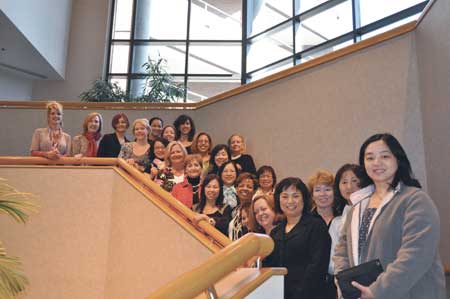JHH Collaborates with Colleagues Around the World
by Rebecca Proch
Once every month since 2007, nursing staff from Tawam Hospital in Abu Dhabi gather for a ninety-minute videoconference. On the other side of the world, a presenter from The Johns Hopkins Hospital’s (JHH) nursing leadership or staff addresses the group, teaching a continuing-education session on topics ranging from implementing The Joint Commission National Patient Safety Goals to managing patient handoffs.
“This is their primary mode for acquiring American Nurses Credentialing Center-approved (ANCC) contact hours for nurse education,” notes Anela Kellogg, BS, RN, OCN, nurse educator at the Institute for Johns Hopkins Nursing (IJHN)—a partnership between JHH and the Johns Hopkins University School of Nursing. “In the past year, we’ve seen a real increase in participation. Lately, there are 200-300 participants.”

This past November JHH nurse clinician, Emily Munchel, BSN, RN, CPN, led a session about the Johns Hopkins Nursing Evidence-Based Practice model and explained to the Tawam nurses how easy it is for a bedside nurse to use. “They were asking a lot of questions. For being as far away as we were, it still felt very interactive,” she says.
The Tawam videoconference series is one of many initiatives that leverage the expertise of Hopkins nurses to connect with the global nursing community. Another is the IJHN Nurse Visitors Week, held semiannually at the School of Nursing. “We host nurses from all over the world and provide them opportunities to learn about Johns Hopkins nursing practice through presentations from hospital and academic leadership, as well as clinical observances on nursing units,” says Jackie Mosberg, program coordinator at IJHN.
During the recent Nurse Visitors Week in October, twenty-four nurses arrived from Hong Kong, Korea, Japan, South Africa, and the United States. “We keep costs low, and that allows nurses who are funding their own travel or who are coming from hospitals with fewer resources to attend,” says Jane Shivnan, MScN, RN, AOCN.
This time there was a focus on Magnet hospitals as a crossover from the ANCC National Magnet Conference the prior week—a strategic schedule decision to accommodate nurses attending that conference. Additionally, the Hong Kong group of nurse managers stayed to participate in Hopkins’ Nurse Manager Academy. “More and more,” says Shivnan, “we are seeing our visitors combine programs like that to take advantage of what we offer.”
Seeking partnerships between Hopkins’ departments, finding opportunities to bring together the clinical and the academic, and leveraging the practical expertise of unit nurses and nurse managers in continuing education are all longtime passions for Shivnan, who now has the opportunity to further broaden Hopkins’ reach. The former IJHN executive director was recently named to a newly created position: executive director for clinical quality and nursing at Johns Hopkins Medicine International (JHI). In her new role she will retain responsibility for IJHN while focusing on international work and on reaching out to JHI’s international affiliates.
One of the newest initiatives Shivnan has helped cultivate is bringing the Nurse Manager Academy to Japan. “Some countries, like Japan, have limited access to our expertise and programs because the language barrier is significant,” she points out. The project came about when one of her JHI colleagues met Kuniko Nishikawa, president and CEO of Firststar Healthcare—a Japanese consulting company—and in turn introduced Nishikawa to IJHN’s leadership. Firststar translated the curriculum and provided guidance to customize it for Japanese nurses.
“It was a fabulous experience,” says Lois Gould, MS, PMP, manager, Continuing Education, at IJHN. Gould worked intensively on the project, from preparing the curriculum to traveling to Japan to train the facilitators who would actually teach it, to observing the Academy in action. “It was ten nurse managers who didn’t know each other, working on small group projects over three days. They are used to didactic learning, and we were asking them to do interactive learning. They really got into it—the energy and participation were great.”
Included in the Academy were two Web-based sessions, each about an hour long, delivered live from Hopkins. Deborah Baker, DNP, CRNP, director of nursing in surgery at JHH, taught techniques for leadership and performance management, while Gina Szymanski, MS, RN, nurse manager at the Sidney Kimmel Comprehensive Cancer Center, presented strategies for high-performing teams. “The participants liked hearing from someone at Hopkins,” says Gould, adding that the webinars were so well-received that when the Academy is presented in Japan again this winter, there are plans to add one or two more.
Shivnan hopes that the experience of bringing the Academy to Japan will pave the way to offer it in other countries. “My experience has been that the work of nurses around the world, though impacted by different things, is fundamentally the same,” she says. “We are all problem-solvers—that’s the nature of the job no matter what we’re doing. Nurses worldwide are trying to solve problems to provide better care. It’s a privilege to be able to be involved in that.”